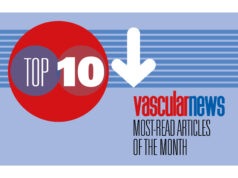
The introduction and incorporation of endovascular procedures as an integral part of the training program for vascular surgical trainees had lead to a paradigm shift both in surgical training and clinical practice. The Accreditation Council for Graduate Medical Education (ACGME) is responsible for the accreditation of all post-MD medical training programs within the US. Since 2000, the ACGME has required all graduating vascular surgical trainees to identify the number and types of endovascular diagnostic and therapeutic procedures performed. A similar requirement only for therapeutic endovascular interventions has been in place since 2001 for graduating general surgical trainees.
In order to assess the number of endovascular procedures performed by vascular fellows and general surgical residents, investigators from Temple University, Philadelphia, PA, examined both the endovascular and total vascular clinical experience of graduating vascular fellows and compared it with the analogous training of graduating general surgical residents in the US. The results were presented at the recent SVS meeting in Baltimore, MD.
The researchers examined and compared the aggregate data for endovascular procedures and total vascular procedures, by graduating vascular and general surgical trainees for the six year period from 2000 to 2005. The data is reported as the mean + standard deviation of cases performed by each trainee.
Presenting the outcomes, Dr John Blebea, Chief of Vascular Surgery at Temple University Hospital and Professor of Surgery at Temple University School of Medicine, revealed that the number of endovascular diagnostic procedures performed by vascular fellows during this time period has increased by 414%, therapeutic procedures by 257% and total cases by 73%. For the first time, more than half (51%) of vascular fellows’ clinical experience in 2005 was composed of endovascular procedures. In direct contrast, surgical residents had a 29% decrease in the total number of vascular procedures performed, with only a small minority being endovascular therapeutic interventions. The results therefore indicate that there has been a significant and progressive increase in both the number of endovascular and total procedures performed by vascular fellows over the past five years (Table 1).
Table 1. A comparison of procedures by vascular fellows and general surgery residents 2000-2005
The investigators concluded that there has been a rapid and progressive increase in endovascular procedures during vascular surgery fellowships. The rise in the number of endovascular procedures has been so rapid that endovascular procedures now encompass more than half of vascular fellows’ total clinical experience, whilst general surgical residents have only a minor participation in endovascular interventions. Therefore, the results indicate a further differentiation of vascular surgery and imply a continuing need to monitor, and potentially modify,both vascular training and certification requirements.
Importantly, these results bring into more serious question prior assertions that graduating general surgical residents are qualified to practice vascular surgery in the present era.













